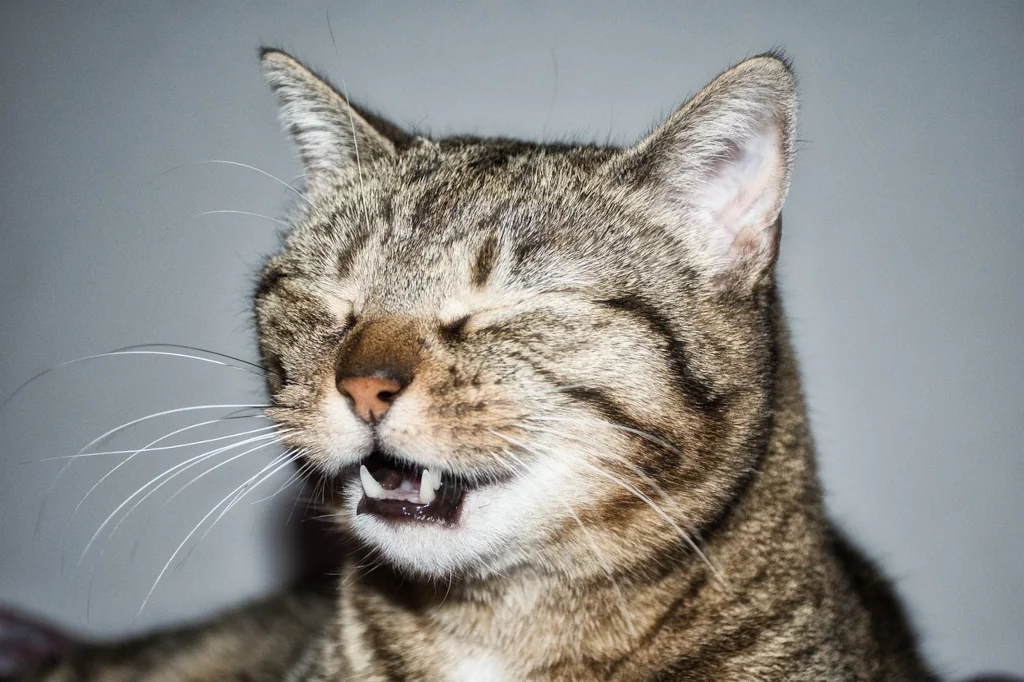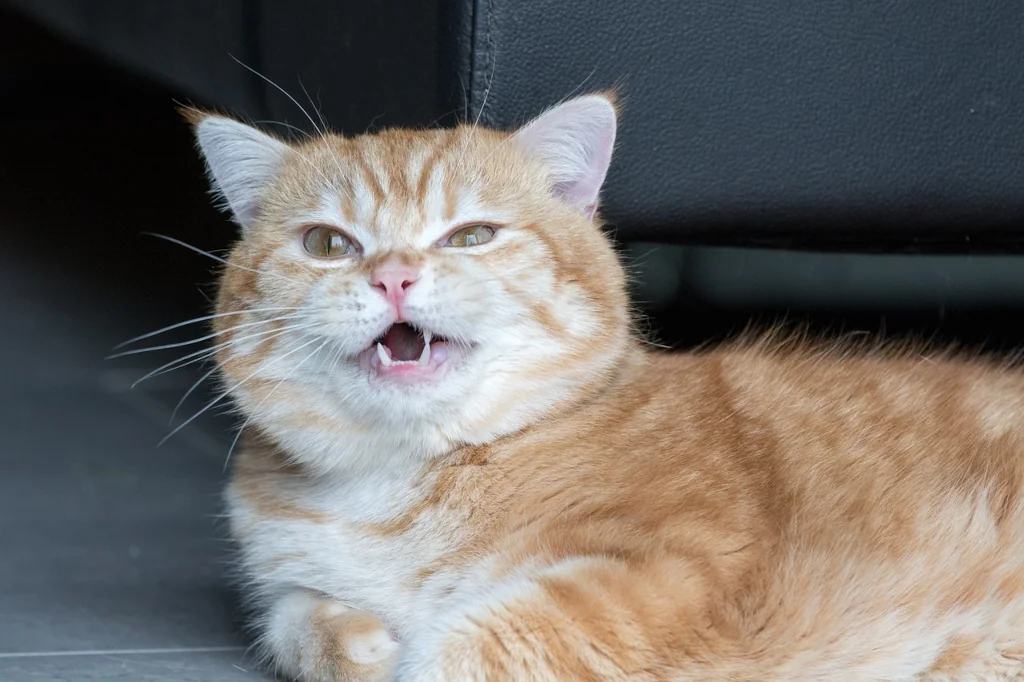There you were, enjoying a calm moment with your cat when ah-choo! Your furry friend sneezed directly into your face, leaving you blinking in surprise and perhaps a bit of concern.
Now that you’ve wiped off the cat sneeze, you might be wondering why this unexpected event occurred in the first place and if you should be worried about more than just the surprise.
From understanding the reasons behind your cat’s sneeze to the potential risks associated with it, we’ll cover it all. Who knew a little cat sneeze could open up a whole world of curiosity?

Why Does Your Cat Sneeze?
Just like humans, cats sneeze for a variety of reasons. It might be a simple reaction to a dusty environment or a pesky furball tickling their nasal passages.
Other times, it can be due to mild irritants like strong smells or smoke. If your feline friend is sneezing frequently, it may signal an underlying health issue, such as a respiratory infection or allergies, and a vet’s consultation might be in order.
But for the most part, an occasional cat sneeze is just a normal part of being a cat.
Can You Catch Anything if Your Cat Sneezes in Your Face?
Now to the question that may have been lingering in your mind since that surprising cat sneeze incident.
The good news is, catching a disease from your cat’s sneeze is highly unlikely. As mentioned before, most cat-related diseases are not zoonotic, so they can’t jump species from cats to humans.
However, there are a few exceptions. Certain bacteria and fungi, though uncommon, can potentially be transmitted. These are generally associated with a cat that’s sick or has an ongoing infection. Therefore, if your cat seems unwell and is sneezing frequently, it’s best to schedule a visit to the vet.
But remember, the chance of you catching something from a healthy cat’s sneeze is minimal. It might be a bit wet and shocking, but it’s usually just a part of the cat ownership package.
Cat Sneezes Often – Is She Sick?
If you’ve noticed that your cat is sneezing often, it could be a sign of something more serious than a dust particle. Sneezing could be the cat’s way of trying to clear its nasal passages of more severe irritants, or it might indicate an underlying health issue.
Common culprits for frequent sneezing include allergies, dental problems, or a respiratory infection such as a cold, flu, or even feline herpesvirus.
Remember, just like with us humans, a single sneeze isn’t a cause for worry, but a consistent sneezing pattern should be addressed. It might not necessarily mean your kitty is critically ill, but it’s definitely worth a check-up.
Keeping an eye on your cat’s behavior and noting any other symptoms such as loss of appetite, lethargy, or discharge from the eyes and nose will help the vet diagnose the issue accurately.

Should You Give Your Cat Medications for Sneezing?
Before you reach for the medicine cabinet, remember this golden rule – never self-medicate your cat without a vet’s advice. Cats have a unique metabolism and what works for humans, or even dogs, might be harmful or fatal for them.
If your cat’s sneezing often and you suspect it’s due to something more than just a bit of dust or smoke, it’s best to take her to the vet. If the vet determines that an underlying illness is causing the sneezing, they will prescribe appropriate medications.
These could range from antibiotics for bacterial infections to antiviral drugs or anti-inflammatory medications, depending on the diagnosis.
The key is to get professional advice. Treating your cat’s symptoms without understanding the cause can lead to more harm than good. It might seem tempting to administer over-the-counter remedies, but remember, your feline friend’s health is best left in the hands of professionals when things seem amiss.
How Can You Prevent Your Cat From Sneezing in Your Face?
It’s tough to completely avoid the occasional cat sneeze in your face, especially if your furball is a close cuddler like my Smokey. But there are steps you can take to minimize those surprise face showers.
First, maintaining a clean environment is key. Regularly clean areas where your cat spends a lot of time to keep dust and allergens to a minimum. Also, ensure your cat’s bedding is washed frequently and kept free of dust mites.
Proper grooming is also essential. Regular brushing can help reduce airborne particles from your cat’s fur that may cause sneezing. Plus, it’s a great bonding time for you and your furry friend.
A lesser-known tip – but one I swear by – is teaching your cat the “head turn” signal. Sounds tricky, right? But with patience, Smokey learned to turn his head to the side when I gently stroke his cheek just before a sneeze. It’s not foolproof, but it’s saved me from many direct hits! Believe it or not, cats can learn to understand such signals.
There was one sneezy afternoon when Smokey was curling up next to me. He already sneezed twice, so I watched him and I gently stroked his cheek, he turned his head away, and let out a big sneeze – away from my face! It was such a victory and proof that patience (and a little bit of cheek stroking) could do wonders!
Remember, your unique relationship with your cat is what makes these strategies work. Patience, consistency, and understanding your cat’s behavior can make sneeze-free snuggle time a reality!
FAQs
How often do cats usually sneeze?
Occasional sneezing in cats is normal, just like in humans. However, if your cat is sneezing multiple times a day for several days in a row, or is showing other symptoms, it may indicate a health issue and you should consult a vet.
How do cats react to human sneezing?
Cats usually react to human sneezing based on the sound’s intensity and their personality. Some cats may be startled, while others may appear curious or remain indifferent.
Can my cat pass on any diseases by sneezing on me?
While it’s rare, a cat sneezing on you could potentially transmit certain bacteria or viruses if they are infected. The risk is generally low but can be higher if your immune system is compromised.
Can I get pink eye from a cat sneezing in my face?
The risk is very low, but theoretically possible if the cat is carrying the bacteria that cause pink eye. It’s always a good idea to wash your face after such encounters and seek medical advice if you develop symptoms.
Alex, a passionate animal lover, has experience in training and understanding animal behavior. As a proud pet parent to two dogs and three cats, he founded AnimalReport.net to share insights from animal experts and expand his knowledge of the animal kingdom.




